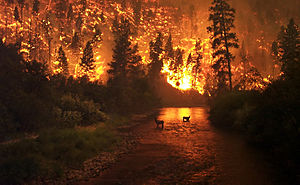 Image via Wikipedia
Image via Wikipedia
Not so, I live ten miles from the sea on the edge of a little village next to a pine forest, which provides me with beautiful scenery as I watch the landscape change with the seasons.
Not quite the thrilling life I was used to but it provides me with the peace and tranquility, (without the distraction of the sea) I need to write my tales of adventure to any willing eye that cares to log into my blog, and to write at my leisure the book I promised myself I would write, if only for my own satisfaction.
Any other interest would just be a bonus.
However back to the story.
Its at this time of year when the kids burn the grass, a thing most young ones do in their youth, but when I did it, it was in places where no damage could be done.
Here,in this village when they do it, forest fires can be started.
The shepherds or herds as they like to be called here are used to burning the old grass to bring forth new shoots for the spring lambs, (burning the mares) the mares being the thick tufts of grass resembling the tail of a horse that need to be thinned out, and that is supposed to be where the young ones are supposed to get the urge to do it, but I think it is just a natural thing young ones do never thinking of the consequences.
Anyway, last night the mares were set alight, and with a strong wind blowing the flames towards the forest it wasn't long before the fire tenders arrived to put them out.
It only took them twenty minutes but that twenty minutes saved what could have become a raging forest fire.
As I watched the fire engine pass my window on its return to the station, I recalled when I was a boy living next door to a fireman which might have encouraged me to become one when I grew up, especially when I was given the chance to ring the bell one hot Sunday afternoon when we passed the fire station and the doors were wide open.
I was only about seven years old and the family had been out for a stroll enjoying the sunshine after church when our neighbour spotted us walking past and invited us in for a look round, lifted me up into one of the tenders and pointed to the strap that was attached to the bell and told me to ring it.
Needing no second invitation I grabbed it and began thrusting it back and forth.
CLANG! CLANG! CLANG! The noise could be heard all over the town of Ayr, and the folk passing by thought the engines were ready to race out to a fire, but smiled when they saw it was only a little lad clanging the bell, the envy of any young boy.
Another time, our neighbour happened to have stopped by his house on the way back from a fire, and just by chance when he was leaving to return to the station, I was leaving my house to catch a bus to school.
"Going to school" he asked, "hop in and I'll give you a lift."
I had to be lifted up, too small to hop in, but I could see out of the window, and waved to some of my school chums who were heading for the bus, and after being dropped of at the school gates I was the talk of all the school, teachers and pupils alike being the envy of them all, having lived the dream of most young boys, whose ambition it was to become a fireman when they grew up.
Today the fire engines have changed dramatically with sirens replacing the bells,what was referred to as the fire engine is now called a tender,and now with females in the service, both the males and females are referred to as firefighters, but regardless of my experiences I never once wanted to go down that road.
My ambition was always to follow in my grandfathers profession and be a fisherman.
Having achieved that I never once regretted it, loving every storm, every beautiful sunset and sunrise, taking the good with the bad, living the dream I carried with me throughout my childhood, leaving the firefighters to fulfill their calling, and the teachers who envied me then, to ponder on what might have been had they followed their dream, but then again they are fulfilling their calling, albeit, maybe their second choice, but it wouldn't do if we all worked at the same occupation, as some of us are only meant to dream of what might have been, while carrying out some other form of work, which are all equally important, when it comes to keeping the wheels of life turning.
![Reblog this post [with Zemanta]](http://img.zemanta.com/reblog_e.png?x-id=8d59d3c0-286c-4165-8fee-d661676357f0)

![Reblog this post [with Zemanta]](http://img.zemanta.com/reblog_e.png?x-id=15bb6b78-fdfd-4de5-92d3-2aa42ddd6cce)
